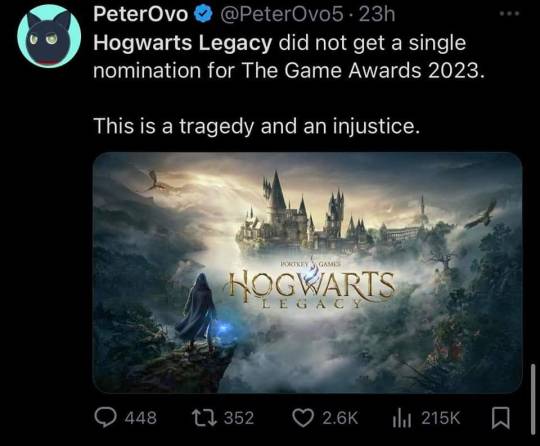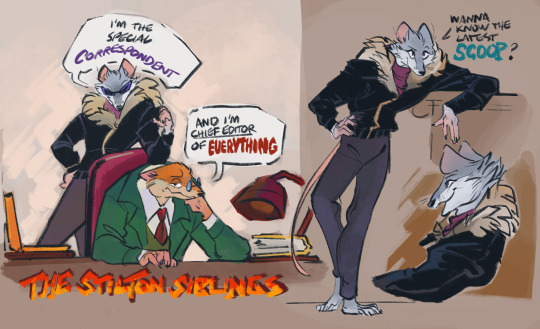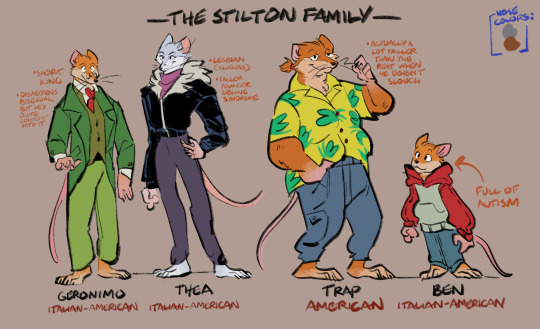#shitty books
Text

This is the best news of the gaming industry recently, ngl
Makes me happy that this crap didn't get nominated.
#hogwarts legacy#shitty game#shitty books#shitty author#anti harry potter#anti jk rowling#terf k rowling#hogwarts and the millions of problems#from a passionate lover to a passionate hater#fuck your nostalgia
36 notes
·
View notes
Text
Haunting Adeline's ending got me like

worthless piece of shit of a book
4 notes
·
View notes
Text
when we’re done with our overwhelming grief we’ll eat i guess
#book 22#im verh drunk#hi#greatest hits#not really sure why this one resonated. are u all ok#is everyone just at the shiva#yall need to stop saying you arent gonna eat then in the tags#i love that a lot of you are getting beautiful things out of this#but some of yall need to know i wrote this while incredibly drunk#this isnt meant to be all that deep this is just shitty iliad posting#more comments like this is just judaism. surprise surprise im jewish#but again this isnt about sitting shiva#this is me drunk talking about the last 3 books of the iliad#idk what to tell u man
18K notes
·
View notes
Text
I can not stress enough that the scene where Percy sends Medusas head to the gods is literally what made me fall in love with Percy as a character bc think about it hes just started his first quest, he's in more danger then he's ever been in his whole life, knowing almost every monster and God is currently out to get him personally, and the most important person in his life has been kidnapped by the god of the dead - so what does he do? He chooses to actively makes the situation worse by sending a middle finger right to the gods bc yeah fuck the gods
#percy jackson#like i mentioned before#i do have a lot of trouble remembering things from the book#but that scene#i had to put the book down bc fuck me#percy you little shit i love you so much#pjo#pjo spoilers#percy jackson spoilers#realised i hadnt spoiler tagged my last post#thats shitty of me#ill go fix that now#walker scobell#percy jackon and the olympians#oifaaaposts
4K notes
·
View notes
Text

*person in the ‘70s voice* Big Bear Babes
4K notes
·
View notes
Text
I post for the girls who have too much love inside them and have to act like they don’t care
#my blog is kinda shitty but it’s yours <3#flop posts galore but they real af#for the girls#dark academia#dps#literature#poetry#quotes#dead poets society#books#write#girlhood#girlblogging
915 notes
·
View notes
Text
The new Martha Wells book-- Witch King-- is fucking delightful if you like slightly complex fantasy that doesn't hold your hand. This is a book that never ever commits the sin of explaining stuff to a character that should already know about it for the sake of the audience. Exposition only happens in ways that are natural and logical, which sometimes means stuff just isn't explained.
It's not as obviously accessible as The Murderbot Dairies is-- it's plot is a little more opaque, there's more moving pieces, it's less directly comedic-- but man I like it and Kai is in someways a similar protagonist to Murderbot. Powerful but vulnerable and often just a little out of his element. Lonely in the face of a lot of people who are afraid of him.
Its very much a found family story. Like, literally. The book goes back and forth between the past and the present. The parts of the narrative that are set in the past are about Kai meeting the people who become his family, and the parts of the narrative set in the present are about him going to find members of that family that have gone missing. Family is a theme that's always there.
In spite of the swap in narratives there was never a moment where I was listening to one half of these stories wishing I could get back to the other one-- they were woven together very well and I found them equally compelling.
Anyway I am very certain there are people who saw there was a new Martha Wells book, then saw it wasn't Murderbot and decided to peace out. Some people probably won't but I think it's worth trying. Tor released enough excerpts that you can get a feel for what it's like and decide if you'll like it or not. The mystery is fascinating and, like Murderbot, it's casually queer in a really good way. Martha Wells clearly loves her a lesbian power couple.
#i listened to the audibook and the narrator is also very good#martha wells#witch king by martha wells#witch king#god i hope this is the first in a trilogy#reviewing partially because i saw someone be shitty this isn't a murderbot book and this offended me#writers can and SHOULD do new things#deal with it
2K notes
·
View notes
Text
Prison-tech is a scam - and a harbinger of your future

If you'd like an essay-formatted version of this post to read or share, here's a link to it on pluralistic.net, my surveillance-free, ad-free, tracker-free blog:
https://pluralistic.net/2024/02/14/minnesota-nice/#shitty-technology-adoption-curve

Here's how the shitty technology adoption curve works: when you want to roll out a new, abusive technology, look for a group of vulnerable people whose complaints are roundly ignored and subject them to your bad idea. Sand the rough edges off on their bodies and lives. Normalize the technological abuse you seek to inflict.
Next: work your way up the privilege gradient. Maybe you start with prisoners, then work your way up to asylum seekers, parolees and mental patients. Then try it on kids and gig workers. Now, college students and blue collar workers. Climb that curve, bit by bit, until you've reached its apex and everyone is living with your shitty technology:
https://pluralistic.net/2021/02/24/gwb-rumsfeld-monsters/#bossware
Prisoners, asylum seekers, drug addicts and other marginalized people are the involuntary early adopters of every form of disciplinary technology. They are the leading indicators of the ways that technology will be ruining your life in the future. They are the harbingers of all our technological doom.
Which brings me to Minnesota.
Minnesota is one of the first states make prison phone-calls free. This is a big deal, because prison phone-calls are a big business. Prisoners are literally a captive audience, and the telecommunications sector is populated by sociopaths, bred and trained to spot and exploit abusive monopoly opportunities. As states across America locked up more and more people for longer and longer terms, the cost of operating prisons skyrocketed, even as states slashed taxes on the rich and turned a blind eye to tax evasion.
This presented telco predators with an unbeatable opportunity: they approached state prison operators and offered them a bargain: "Let us take over the telephone service to your carceral facility and we will levy eye-watering per-minute charges on the most desperate people in the world. Their families – struggling with one breadwinner behind bars – will find the money to pay this ransom, and we'll split the profits with you, the cash-strapped, incarceration-happy state government."
This was the opening salvo, and it turned into a fantastic little money-spinner. Prison telco companies and state prison operators were the public-private partnership from hell. Prison-tech companies openly funneled money to state coffers in the form of kickbacks, even as they secretly bribed prison officials to let them gouge their inmates and inmates' families:
https://www.motherjones.com/politics/2019/02/mississippi-corrections-corruption-bribery-private-prison-hustle/
As digital technology got cheaper and prison-tech companies got greedier, the low end of the shitty tech adoption curve got a lot more crowded. Prison-tech companies started handing out "free" cheap Android tablets to prisoners, laying the groundwork for the next phase of the scam. Once prisoners had tablets, prisons could get rid of phones altogether and charge prisoners – and their families – even higher rates to place calls right to the prisoner's cell.
Then, prisons could end in-person visits and replace them with sub-skype, postage-stamp-sized videoconferencing, at rates even higher than the voice-call rates. Combine that with a ban on mailing letters to and from prisoners – replaced with a service that charged even higher rates to scan mail sent to prisoners, and then charged prisoners to download the scans – and prison-tech companies could claim to be at the vanguard of prison safety, ending the smuggling of dope-impregnated letters and other contraband into the prison system.
Prison-tech invented some wild shit, like the "digital stamp," a mainstay of industry giant Jpay, which requires prisoners to pay for "stamps" to send or receive a "page" of email. If you're keeping score, you've realized that this is a system where prisoners and their families have to pay for calls, "in-person" visits, handwritten letters, and email.
It goes on: prisons shuttered their libraries and replaced them with ebook stores that charged 2-4 times the prices you'd pay for books on the outside. Prisoners were sold digital music at 200-300% markups relative to, say, iTunes.
Remember, these are prisoners: locked up for years or decades, decades during which their families scraped by with a breadwinner behind bars. Prisoners can earn money, sure – as much as $0.89/hour, doing forced labor for companies that contract with prisons for their workforce:
https://www.prisonpolicy.org/blog/2017/04/10/wages/
Of course, there's the odd chance for prisoners to make really big bucks – $2-5/day. All they have to do is "volunteer" to fight raging wildfires:
https://www.hcn.org/articles/climate-desk-wildfire-california-incarcerated-firefighters-face-dangerous-work-low-pay-and-covid19/
So those $3 digital music tracks are being bought by people earning as little as $0.10/hour. Which makes it especially galling when prisons change prison-tech suppliers, whereupon all that digital music is deleted, wiping prisoners' media collection out – forever (literally, for prisoners serving life terms):
https://www.eff.org/deeplinks/2018/08/captive-audience-how-floridas-prisons-and-drm-made-113m-worth-prisoners-music
Let's recap: America goes on a prison rampage, locking up ever-larger numbers of people for ever-longer sentences. Once inside, prisoners had their access to friends and family rationed, along with access to books, music, education and communities outside. This is very bad for prisoners – strong ties to people outside is closely tied to successful reentry – but it's great for state budgets, and for wardens, thanks to kickbacks:
https://www.prisonpolicy.org/blog/2021/12/21/family_contact/
Back to Minnesota: when Minnesota became the fourth state in the USA where the state, not prisoners, would pay for prison calls, it seemed like they were finally breaking the vicious cycle in which every dollar ripped off of prisoners' family paid 40 cents to the state treasury:
https://www.kaaltv.com/news/no-cost-phone-calls-for-those-incarcerated-in-minnesota/
But – as Katya Schwenk writes for The Lever – what happened next is "a case study in how prison communication companies and their private equity owners have managed to preserve their symbiotic relationship with state corrections agencies despite reforms — at the major expense of incarcerated people and their families":
https://www.levernews.com/wall-streets-new-prison-scam/
Immediately after the state ended the ransoming of prisoners' phone calls, the private-equity backed prison-tech companies that had dug their mouth-parts into the state's prison jacked up the price of all their other digital services. For example, the price of a digital song in a Minnesota prison just jumped from $1.99 to $2.36 (for prisoners earning as little as $0.25/hour).
As Paul Wright from the Human Rights Defense Center told Schwenk, "The ideal world for the private equity owners of these companies is every prisoner has one of their tablets, and every one of those tablets is hooked up to the bank account of someone outside of prison that they can just drain."
The state's new prison-tech supplier promises to double the amount of kickbacks it pays the state each year, thanks to an aggressive expansion into games, money transfers, and other "services." The perverse incentive isn't hard to spot: the more these prison-tech companies charge, the more kickbacks they pay to the prisons.
The primary prison-tech company for Minnesota's prisons is Viapath (nee Global Tel Link), which pioneered price-gouging on in-prison phone calls. Viapath has spent the past two decades being bought and sold by different private equity firms: Goldman Sachs, Veritas Capital, and now the $46b/year American Securities.
Viapath competes with another private equity-backed prison-tech giant: Aventiv (Securus, Jpay), owned by Platinum Equity. Together, Viapath and Aventiv control 90% of the prison-tech market. These companies have a rap-sheet as long as your arm: bribing wardens, stealing from prisoners and their families, and recording prisoner-attorney calls. But these are the kinds of crimes the state punishes with fines and settlements – not by terminating its contracts with these predators.
These companies continue to flout the law. Minnesota's new free-calls system bans prison-tech companies from paying kickbacks to prisons and prison-officials for telcoms services, so the prison-tech companies have rebranded ebooks, music, and money-transfers as non-communications products, and the kickbacks are bigger than ever.
This is the bottom end of the shitty technology adoption curve. Long before Ubisoft started deleting games that you'd bought a "perpetual license" for, prisoners were having their media ganked by an uncaring corporation that knew it was untouchable:
https://www.youtube.com/watch?v=VIqyvquTEVU
Revoking your media, charging by the byte for messaging, confiscating things in the name of security and then selling them back to you – these are all tactics that were developed in the prison system, refined, normalized, and then worked up the privilege gradient. Prisoners are living in your technology future. It's just not evenly distributed – yet.
As it happens, prison-tech is at the heart of my next novel, The Bezzle, which comes out on Feb 20. This is a followup to last year's bestselling Red Team Blues, which introduced the world to Marty Hench, a two-fisted, hard-bitten, high-tech forensic accountant who's spent 40 years busting Silicon Valley finance scams:
https://us.macmillan.com/books/9781250865878/thebezzle
In The Bezzle, we travel with Marty back to the mid 2000s (Hench is a kind of tech-scam Zelig and every book is a standalone tale of high-tech ripoffs from a different time and place). Marty's trying to help his old pal Scott Warms, a once-high-flying founder who's fallen prey to California's three-strikes law and is now facing decades in a state pen. As bad as things are, they get worse when the prison starts handing out "free" tablet and closing down the visitation room, the library, and the payphones.
This is an entry to the thing I love most about the Hench novels: the opportunity to turn all this dry, financial skullduggery into high-intensity, high-stakes technothriller plot. For me, Marty Hench is a tool for flensing the scam economy of all its layers of respectability bullshit and exposing the rot at the core.
It's not a coincidence that I've got a book coming out in a week that's about something that's in the news right now. I didn't "predict" this current turn – I observed it. The world comes at you fast and technology news flutters past before you can register it. Luckily, I have a method for capturing this stuff as it happens:
https://pluralistic.net/2021/05/09/the-memex-method/
Writing about tech issues that are long-simmering but still in the periphery is a technique I call "predicting the present." It's the technique I used when I wrote Little Brother, about out-of-control state surveillance of the internet. When Snowden revealed the extent of NSA spying in 2013, people acted as though I'd "predicted" the Snowden revelations:
https://www.wired.com/story/his-writing-radicalized-young-hackers-now-he-wants-to-redeem-them/
But Little Brother and Snowden's own heroic decision have a common origin: the brave whistleblower Mark Klein, who walked into EFF's offices in 2006 and revealed that he'd been ordered by his boss at AT&T to install a beam-splitter into the main fiber trunk so that the NSA could illegally wiretap the entire internet:
https://www.eff.org/document/public-unredacted-klein-declaration
Mark Klein inspired me to write Little Brother – but despite national press attention, the Klein revelations didn't put a stop to NSA spying. The NSA was still conducting its lawless surveillance campaign in 2013, when Snowden, disgusted with NSA leadership for lying to Congress under oath, decided to blow the whistle again:
https://apnews.com/article/business-33a88feb083ea35515de3c73e3d854ad
The assumption that let the NSA get away with mass surveillance was that it would only be weaponized against the people at the bottom of the shitty technology adoption curve: brown people, mostly in other countries. The Snowden revelations made it clear that these were just the beginning, and sure enough, more than a decade later, we have data-brokers sucking up billions in cop kickbacks to enable warrantless surveillance, while virtually following people to abortion clinics, churches, and protests. Mass surveillance is chugging its way up the shitty tech adoption curve with no sign of stopping.
Like Little Brother, The Bezzle is intended as a kind of virtual flythrough of what life is like further down on that curve – a way for readers who have too much agency to be in the crosshairs of a company like Viapath or Avently right now to wake up before that kind of technology comes for them, and to inspire them to take up the cause of the people further down the curve who are mired in it.
The Bezzle is an intense book, but it's also a very fun story – just like Little Brother. It's a book that lays bare the internal technical workings of so many scams, from multi-level marketing to real-estate investment trusts, from music royalty theft to prison-tech, in the course of an ice-cold revenge plot that keeps twisting to the very last page.
It'll drop in six days. I hope you'll check it out:
https://us.macmillan.com/books/9781250865878/thebezzle
#pluralistic#the bezzle#marty hench#books#prison-tech#scams#jpay#securus#minnesota#prisones#shitty technology adoption curve#drm#enshittification#kickbacks#corruption#private equity#viapath#global tel link#bribery#aventiv#disciplinary technology#fcc#predicting the present#carceral state
586 notes
·
View notes
Photo


it’s cold brew season again babyyy
#and did I start it off strong with spilling half of the cold brew & coffee grounds all over my kitchen counter bc of a shitty system of 2#mason jars?? no no i did not why are u even asking me that that's a weirdly specific scenario to be asking about r u okay#studyblr#study#studyspo#booklr#bookblr#books#book#reading#read#dark academia#studying#aesthetic#may 2023#2023
3K notes
·
View notes
Text



Uh oh…someone’s been reading too many of the Stilton books lately…
I want his sister.
#i only read the books for the subplot#and the subplot’s just her…#I gotta get the Thea books later#I hope you all enjoy my shitty headcanons#geronimo stilton#thea stilton#myart#doodle#furry art#deadkat’s stiltons
692 notes
·
View notes
Text
Comic book writers who still make Bruce hit his kids even after years of mass criticism from fans who TELL you it's a bad creative choice that pushes them away from the fan base and comics in general,,, you did this for what?
#no bc like lets talk about it. if you hate robins that much. just. don't include them. but it's a very specific case of brain rot for comic#book nerds and writers -- MALE comic book nerds & writers -- that just. stops them from understanding#we're here because we love seeing bruce being a good father? we're here because we enjoy seeing a male superhero capable of#care and love after being so heavily traumatized to OTHER traumatized people? like. why. why is it so hard#to believe we love bruce more when he's a good father? ik the answer -- its bc these creators and consumers are#shitty men in general and they're incapable of understanding we might find healthy traits cooler than the machismo toxicism they've#been regurgitating since the fucking 90s#please just let a woman or a non shitty mam write bruce because this is so tiring#bruce wayne#dc#batman#bruce wayne is a good dad
2K notes
·
View notes
Text


Inspired by Way Down We Go by @xiaq 🪄
Draco and Harry found a way to snuggle together while remaining as clueless, platonic best bros and it's a bit hilarious and very sweet, so I had to draw it :)
#I recommend this fanfic it's a very tragic fun read :>#xiaq does lots of interesting world building#harry potter#draco malfoy#drarry#hp art#drarry fanart#drarry fanfic#xiaq#harry potter art#wolf#pet wolf#werewolf#doggos are cute#copying xiaq's JK Rowling disclaimer here#because I couldn't phrase it better :>#Obviously we're already operating on the notion that there are several problematic aspects of Rowling's books#but just in case it wasn't clear from my rather heavy-handed narrative adjustments--I do not support TERF extraordinaire JK Rowling; howeve#I refuse to let her shitty worldviews ruin my nostalgia or my love of the HP fandom I've grown up with. Just to make that clear.#werewolf harry potter#way down we go
2K notes
·
View notes
Text

Long time no shakarian shitpost have a wip for now :3c
#mass effect#garrus vakarian#Isani Shepard#astro art#my art#shakarian#mass effect 2#joker gave him a book of shitty pickup lines
465 notes
·
View notes
Text

look at them. the sillies. look at ciri's bad haircut yessjsksjskdjdj
#young ciri with shitty hair supremacy#the witcher#the witcher art#the witcher books#geralt training ciri#cirilla fiona elen riannon#babygirls#geralt of rivia#triss merigold#idk if that's eskel or lambert but i'm gonna guess that's eskel#kaer morhen
475 notes
·
View notes
Text
"Aegon and Team Green didn't need to take the throne, there was no need to, it's not like their survival depended on it because all the lords would've accepted Rhaenyra as heir! They promised her and her father that they would!"
Have y'all seen how women are treated in ASOIAF? The general view is that they're property, decoration, and/or pleasure/heir makers. You really think people in Westeros actually view Rhaenyra any differently just because she's a Targaryen and the last king said so? Add to this the scandals of the brothel sighting, killing Laenor, marrying Daemon, and trying to pass three obvious bastard children as legitimate heirs? Obviously it's the sexism it's the misogyny it's a bad thing, but that's the world of ASOIAF. I would encourage anyone who thinks that women of this world aren't treated abhorrently to read the series. Even if one of the lords felt some type of way about Rhaenyra sitting the Iron Throne for whatever reason they would push for someone with an alternate claim, and that someone else would be her brother. To stop people from rallying to other claimants, Rhaenyra would have to make it so there are no other claimants.
#like do y'all even know how shitty this world really is to women? and you think they're gonna just fully accept a queen? and THIS queen?#like I'm reading through the books and it's just. appalling#team green#anti team black#hotd
173 notes
·
View notes
Text
"nobody outside Tumblr knows jk Rowling is like that"
HER OPPOSING A NEW LAW AGAINST HATE CRIMES IS ON THE FRONT PAGE OF THE WIDEST DISTRIBUTED FREE NEWSPAPER IN ENGLAND IF NOT THE UK. EVEN IF YOU DON'T READ WHO SHE'S ESSENTIALLY THREATENING WHEN SHE DARES THE COPS TO ARREST HER YOU KNOW SHE'S A PRICK
#THE MAJORITY OF THE BRITISH PUBLIC ARE EITHER IN FAVOUR OF OR TOTALLY NEUTRAL TO TRANS PEOPLE#IT'S JUST LIKE TWO HUNDRED ABSOLUTE CUNTS SCREAMING THEIR HEARTS OUT#AND BECAUSE THEIR PARENTS ARE RICH#OR THEY WROTE A SHITTY FUCKING KIDS BOOK THIRTY YEARS AGO#WE HAVE TO ACT LIKE THEIR OPINIONS MATTER#YES 'THEIR PARENTS ARE RICH' APPLIES TO PEOPLE WHO MAKE FUCKING STUPID RULES AT THE BBC
170 notes
·
View notes